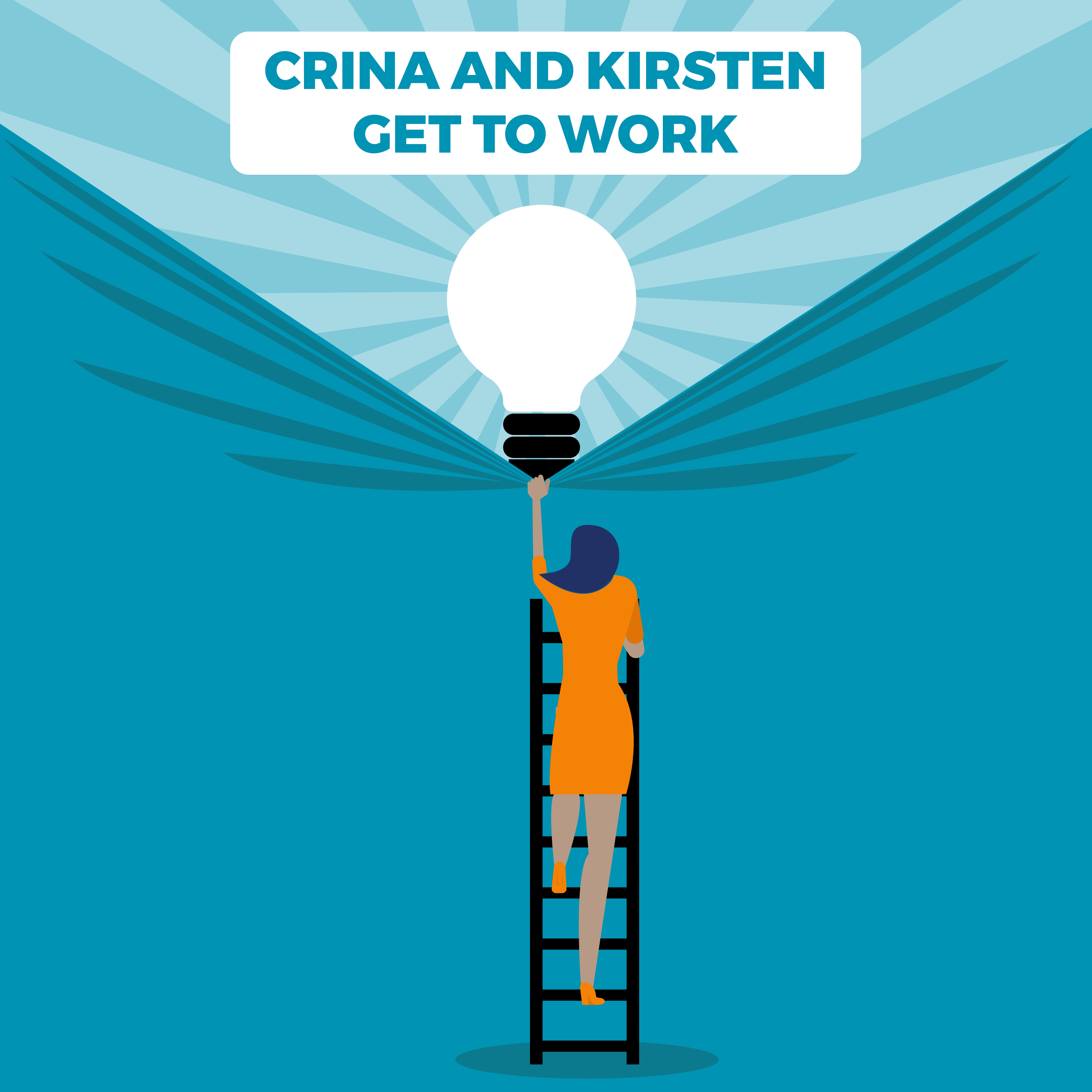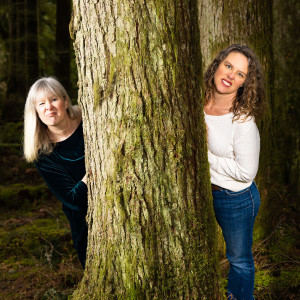Crina and Kirsten Get to Work

We have one single mission: Help women find ease, meaning and joy at work and in life. We use our experiences as business owners, entrepreneurs, mentors and inspirational leaders to explore topics that all working women care about: shitty bosses; smashing the patriarchy; balancing work and life; navigating change and getting what you want! We guarantee that you will be entertained and inspired... promise!
Episodes
Episodes



Friday Sep 23, 2022
Toxic Workplaces: How to See the Signs (& How To Deal With Them)
Friday Sep 23, 2022
Friday Sep 23, 2022
Workplace culture is created by the people on your team, your leaders, and the written and unwritten rules that guide behavior. When these “norms” result in feeling psychologically unsafe or they get in the way of your being effective, it is toxic.
Adam Grant says there are two fundamental tensions in organizational culture - the tension between results and relationship and the tension between rules and risk. When these tensions are out of balance, it leads to a toxic workplace.
Grant says the first sin of a toxic workplace is bad behavior - or toxicity. What we are talking about here is disrespectful, demeaning and abusive behavior, people who are non-inclusive, unethical, cutthroat or overly competitive - and of course the list goes on. The workplace where these negative behaviors occur prioritizes results over relationships. This kind of behavior in the workplace is one of the drivers of the great resignation.
If a workplace goes to the other side and flips the focus from results to relationships, we have the second sin, which is mediocracy. These workplaces value relationships above results to such a degree that people are not held accountable. There is no incentive to do a good job because whether you do a good job or a terrible job, the rewards are the same.
The third deadly sin of the toxic workplace is bureaucracy. Bureaucracy helps up manage risk - and that is good. If a culture is focused on rules and procedures to manage risk, then there is no creativity, no change and no risk. As with mediocrity, there is no reward for efficiency, innovation and collaboration.
The other side of bureaucracy is anarchy, the fourth sin of the toxic workplace. In a culture of anarchy, there is all risk and no rules. Anyone can do whatever they want, strategy and structure be damned. No one learns from the past or lands on the same page. It’s pure chaos. Interpersonal relationships are difficult in a culture with no or few rules because everyone is on their own.
Grant has some questions to ask before you take a job to determine culture - and these are great questions for us to ask ourselves about our current work situation:
Tell me what happens here that does not happen in other places?
Tell me about a time when people did not walk the talk here?
Tell me a story about who gets hired, fired and promoted?
Learning about workplace culture is vital before you take a job. For those of us who are currently in jobs, these questions can help us discern our discomfort and take action to address it - whether that means leaving a job, changing our attitudes, accepting what is - or even just getting affirmation that our discomfort is valid.
Why Every Leader Needs to Worry About Toxic Culture
Toxic Culture Is Driving the Great Resignation



Friday Sep 09, 2022
Workplace Gossip--How To Do It Well
Friday Sep 09, 2022
Friday Sep 09, 2022
Workplace gossip happens everywhere, so it’s about time we learned how to do it well! Let’s face it–gossip helps us build relationships, understand norms, address bad behavior, and have fun! Unfortunately, gossip has gotten a bad rap…until now.
SHOW NOTES
Researchers define gossip as “talking about someone who is not present” and, according to research, people spend an average of 52 minutes a day gossiping. Gossip is not always negative. In fact, as one study found, most if gossip is actually neutral, and according to researchers - boring.
Since we have this strong impulse to gossip, it is important to get it right and to do it in a way that is not destructive to the workplace. Gossip has a bad rap, and for good reason, but it allows us to feel closer to others at work and can raise trust and intimacy. It also allows us to form workplace norms and to pass on information to others about those norms - and it builds cooperation. And even though gossip can hurt - it drives self-reflection.
The problem with gossip is that unless it is done well, it can cause significant negative impacts in the workplace. Just as gossip can build trust, gossip can erode trust. Gossip can waiste our time and cause anxiety. And of course, gossip can cause hurt feelings and create divisiveness in the workplace.
It is really important to gossip well. Crina and Kirsten have some suggestions:
Focus on the behavior, not the person
Avoid triangulation
Focus on our own experiences, not representing someone else's
Understand the difference between valid information and hearsay
Keep it “above the belt” Don’t talk or make up crappy stories
Be aware of the narrative you’re creating about yourself when you gossip!
Don’t use gossip as a way to damage someone or as a mechanism to get ahead
Don’t distort the truth or embellish (remember the game of telephone?)
Stay away from gossip over email or in writing.
We are going to gossip in the workplace because we are, well, human, so let’s get it right at work!
Good Read:
The Science Behind Why People Gossip—And When It Can Be a Good Thing



Friday Aug 26, 2022
Imposter Syndrome: When You Feel Like You’re Faking It.
Friday Aug 26, 2022
Friday Aug 26, 2022
Your success and achievement is the result of your efforts, talents and skills–not luck! So why do many of us still feel like we don’t belong, or even worse, don’t deserve the kudos, rewards, titles and positions that we possess? The answer: Imposter Syndrome.
Imposter syndrome was “discovered” in the 1970s by two psychologists, Pauline Rose Clance and Suzanna Imes. They studied graduate and undergraduate students and found it to be very prevalent in women, ultimately designing a scale and a test to identify levels of imposterism - see the link to the test below. Imposter syndrome is not a mental health diagnosis or condition, rather it is an experience most of us have at some point - and many experience it frequently - up to 80% according to some studies.
Imposterism is the persistent inability to believe one's success is deserved or has been legitimately achieved as a result of one's own efforts; the internal experience of believing one is not as competent as others perceive one to be, a fraud. It is the belief that success and achievement are luck or a coincidence. In low doses, these feelings and beliefs are just part of the human experience. In higher doses, imposterism interferes with our ease, meaning and joy at work.
Imposterism looks like:
An inability to realistically assess our competence and skills
Attributing success to external factors
Berating your performance
Fear you won't meet expectations
Setting very challenging goals and feeling disappointed when you fall short
Perfectionism
And it feels like anxiety,fear and self-doubt.
Interestingly, recent data suggests it is just as prevalent in men - and the effects on men may be more significant and these effects cause more significant impacts to performance.
We can be more vulnerable to imposterism by our upbringing (valuing of achievement, controlling parents, high-levels of conflict); a new experience or challenge; our personality (anxious, lack of confidence, perfectionism).
Consistently, the smart folks have similar strategies to address the imposter syndrome. First - mindset - what if we take the approach that imposter syndrome is a growth opportunity rather than a deficit? Second - tell the truth - the imposter is like a mean friend - call her out with your higher self, your own heroine - or your Sage (remember the foil to our Saboteur?). Have you really always failed? Is this experience really certain to be a disaster? Consider other situations that have been successful - or even not a failure - draw on experiences where your decisions and actions have worked out and apply them to the current situation - spend time revisiting positive experiences and feedback. Peter Shepherd, who has an excellent TedTalk on this subject, calls it the two-step - like a dance - when a negative thought arises, address it with an evidence based analysis of your experience.
Clance IP Scale
Prevalence, Predictors, and Treatment of Impostor Syndrome: a Systematic Review - PubMed (nih.gov)
The Surprising Solution to the Imposter Syndrome | Lou Solomon | TEDxCharlotte - Bing video
What if imposter syndrome is a good thing? | Peter Shepherd | TEDxUniMelb - Bing video



Friday Aug 12, 2022
Self Sabotage: Why We Get in Our Own Way, and How To Stop It
Friday Aug 12, 2022
Friday Aug 12, 2022
Barriers to success exist everywhere, even inside your head! When you act, or fail to act, in your best interest, you’re actually sabotaging yourself. In this motivational podcast, we discover our very own saboteurs and the many ways to get them out of the driver’s seat.
SHOW NOTES
Self - sabotage is where we undermine our own goals, values, wants and desires, either consciously or unconsciously. We act – or fail to act – based on a set of habits – in a way that is against our interests. This episode was inspired by a friend, but it turns out we all have our own saboteur.
It turns out self-sabotage comes from the patterns and beliefs we developed in early childhood, and into our teens and early 20s, that are designed to help us make sense of the world, protect us from difficult feelings, help us develop…but these patterns may no longer serve us into adulthood. Dealing with your saboteur requires that we raise our self-awareness.
Shirzad Charmine, through his work which he calls Positive Intelligence, offers a process to identify our saboteur and get her out of the driver’s seat of our brains. He proposes we put our higher, wiser self in the driver’s seat – and he calls her our Sage.
Shirzad says there are thoughts and voices in our head that generate negative emotions when we handle life’s challenges. They exist in the brainstem, limbic system, and parts of the left brain and produce much of your stress, anxiety, self-doubt, anger, shame, guilt, frustration, and mind chatter. These negative emotions are only helpful for a second as they alert you to dangers or issues. However, staying in these emotions hurts our ability to see clearly and choose the most impactful response. Our Saboteurs generate all our negative emotions, including stress, anxiety, self-doubt, anger, avoidance, procrastination, insensitivity or discontent. A bit of pain is good - it tells us something, but we are not meant to live there.
Our Sage lives in an entirely different region of our brain, the middle prefrontal cortex, “empathy circuitry”, and parts of the right brain. It generates positive emotions while handling life’s challenges. These include empathy, compassion, gratitude, curiosity, joy of creativity, and calm, clear-headed laser-focused action. This region is wired for creativity and big picture awareness of what is important and the best course of action.
TAKE THE TEST to discover your Saboteur and unseat her!! Shirzad’s site also provides guidance on strategies we are using that do not work for us and will help get our Sage in the driver’s seat. https://www.positiveintelligence.com/ . When we expose our Saboteur, it takes away the power of these not so useful beliefs and responses and allows us to make different choices. Dealing with our Saboteur also requires us to have some empathy for ourselves, get curious, be creative, choose and move into action.
Shirzad’s wish for us is that we rediscover our own amazing, wonderfulness – the essence of ourselves we were born with - and let that truth guide our beliefs, reactions and responses to achieve the magic of ease, meaning and joy. We love this approach.
More Good Reads:
How women self sabotage their career and how to deal with it?
The Nine Ways Women Self-Sabotage



Friday Jul 29, 2022
Workplace Performance Anxiety: The Fear of Failure
Friday Jul 29, 2022
Friday Jul 29, 2022
Workplace performance anxiety can strike when you least expect it: in front of a microphone; in a meeting; when dealing with a difficult customer; even during workplace social events. Feeling afraid about your ability to perform a task undermines your success, impacts your team, makes you irritable, and impacts your ability to create meaningful relationships.
SHOW NOTES
Performance anxiety presents itself as racing pulse and rapid breathing, dry mouth, tight throat, trembling hands, knees, voice, sweaty hands, cold hands, nausea - and a queasy stomach. Performance anxiety is often a self-fulfilling prophecy - distracting us from doing our best at whatever we are trying to do.
In 2019 the Royal Academy of Dramatic Arts (“RADA”), which provides communication skills training for corporate individuals, studied performance anxiety in 1000 workplaces and published a report. RADA found we are most likely to suffer workplace anxiety in job interviews, dealing with disagreements or complaints, delivering big presentations, and even workplace socializing. Men and women experience performance anxiety differently - men experience more performance anxiety around socializing and team-building and women in making presentations to a group, a job interview and asking for a raise.
RADA reports that most of what we are afraid of is really about our ego - looking stupid, agreeing to something we do not want to do, worrying what people think of us, we are not good enough - interestingly, we worry less about losing our job or not getting a promotion. This makes sense when we remember that we seek psychological safety and validation from others.
What do we do about this? Here are some tips to deal with performance anxiety:
If you are presenting or speaking, be prepared and practice, practice, practice.
Shift your focus from fear to what you hope to accomplish.
Be careful about what you put in your body - caffeine and sugar can increase those pesky negative feelings and body sensations. Go for small, healthy meals.
Don't focus on what could go wrong, rather, focus on the positive. Visualize your success.
Avoid thoughts that produce self-doubt.
Breathing and meditation are effective strategies to help you relax and focus on what is important.
Try a quick walk or a few jumping jacks - just moving your body can alleviate anxious feeling before something important
Performance anxiety is something that affects most of us - and it turns out the impact is pretty significant - so try some of these strategies and move your energy to doing your best job to move yourself out of performance anxiety and into performance!



Friday Jul 15, 2022
What’s Your Problem?
Friday Jul 15, 2022
Friday Jul 15, 2022
Every day is fraught with problems large and small. From feeling “stuck” on a project, to tackling a major meltdown, you are likely solving problems all day every day. How do you know if you’re hitting the mark? What’s your process to find the best solution? Are you inspiring creativity or simply checking the boxes?
SHOW NOTES
According to the World Economic Forum 2020 Future of Jobs Report, the top key skills of tomorrow’s labor market are centered on problem solving - analytical thinking, active learning, complex problem-solving, critical thinking and analysis and of course, creativity, originality and initiative. We know from our daily lives these skills are important and the data supports us.
So what do we do with the myriad of problems, big and small in our lives? First, remember that problems are an opportunity to make something better and relieve suffering and discomfort. Second, identify the problem, which many people find to be the hardest part of problem solving. Sometimes we solve for the symptoms and not the problem, so get real curious about the root of the problem. Third, generate multiple solutions to create lots of options to choose from. It is easy to find one solution and go for it, but taking time can allow creativity to work and often results in an even better idea to solve the problem. Once we have long lists of great solutions, we can choose the best one - and afterwards, re-evaluate to ensure we solved the problem.
Creativity and innovation are extremely important to problem solving and making the most of the opportunity a problem creates. There are steps we can take to increase our creativity - again start with that open and abundant mindset, which helps us remember all (or many, many) things are possible. Collaboration and cross-pollination - which means including other people in the process. These are rich soils in which to grow creativity.
And some helpful hints on problem solving . . .
The basics are important in problem solving. Sometimes a glass of water and a snack - and maybe even a walk - are just the things we need physically to support the brain power needed for effective and creative problem solving.
Keep an eye out for when it is time to let things go. Sometimes there is no good solution, which means it is time to consider whether we can eliminate the problem, reduce its impact, pass it to someone else or even put off finding a solution until the circumstances are different.
Lastly, be careful of problems that are not ours to solve. Solving for other people’s feelings, other people’s job responsibilities, other people’s mistakes or omissions, can sometimes be a kindness, but is often part of a pattern of dysfunction.
We know we will have a problem today - how can we create more ease, meaning and joy from it?



Friday Jul 01, 2022
Friday Jul 01, 2022
Iceland’s First Lady, Eliza Reid’s recent book, The Sprakar: Iceland’s Extraordinary Women, inspired this timely exploration of the policies, strategies and approaches Iceland has used to achieve its first place spot in gender equity. The word Sprakar means wise, powerful woman. Wow - a language with a name for a bad-ass woman! Here is some of what she has to say:
Iceland holds to #1 spot in the world in gender equity according to the World Economic Forum Gender Gap Index. The US is ranked #53. Most striking, 88% of Icelandic women work outside the home while only 57.4% of US women work outside the home. What is going on in Iceland?!
HELPING PARENTS HELPS US ALL
Comprehensive healthcare for pregnant moms removes the burden of not having adequate prenatal and maternal care. The government provides leave to both parents - up to 9 months between the 2 parents. Subsidized high-quality childcare is available in most neighborhoods. The government offers pre-k education along with a traditional schooling system, plus after school programming. Iceland believes that supporting families supports society at large - and women who work.
STRENGTH IN SISTERHOOD
Women in Iceland have a long tradition of creating social networks and groups to foster connection. In the past, it may have been a knitting or crafting group or a group that organized around philanthropy, while today it may be a cold water swimming group, hiking, art or other interest group.
STIGMA FREE SEXUALITY
Iceland has a relatively stigma- free culture of sexuality. Transgender people feel alot of acceptance in Iceland. Iceland’s results tell us when women and transgender people’s sexuality is not judged and controlled, women experience more equity.
CLAIMING THE CORPORATE PURSE STRINGS
Iceland has adopted broad laws that require equity. Its pay equity law requires businesses to prove pay equity. It has also adopted a law to require 40% membership on corporate boards of directors. Both of these laws have led to significant progress on both issues.
When we talk about what we can do to create ease, meaning and joy for women at work, Iceland may be the best place for us to look.



Friday Jun 17, 2022
Toxic Coworkers: Removal, Remediation and Containment
Friday Jun 17, 2022
Friday Jun 17, 2022
Toxic coworkers–we know ‘em when we see ‘em. They’re passive aggressive, short/curt, rude people, lacking self-awareness with narcissistic tendencies who do not take responsibility, may gaslight us, take credit for others’ accomplishments and make our lives miserable!
THE EFFECTS OF TOXICITY
Toxic coworkers suck up all the time, money and energy in the workplace. In the article “How Toxic Colleagues Corrode Performance,” the authors polled thousands of managers and employees on the receiving end of antisocial behavior from a colleague and found that work quality and quantity of work decreased and folks also lost time - in terms of hours worked, avoiding that coworker or worrying about that coworker.
The data also support the toxic coworker is often responsible for team dysfunction. Functional teams are often called loyalist teams. Dysfunctional teams are often called saboteur teams - and no surprise, are significantly more likely to contain a toxic coworker.
TOXIC TOP PERFORMER
Many people believe we need to put up with toxic behavior if the person is a top performer. It turns out this is another one of those upside down common beliefs in the workplace. The paradox for leaders is that the common traits of a toxic worker can mean they are a top performer in the company. Tomas Chamorro-Premuzic writes in his article “Why Bad Guys Win at Work,” “for some toxic employees there is a bright side to their dark side. For example, Machiavellian traits such as superficial charm, charisma, self-confidence and interpersonal manipulation can be valuable when developing new client relationships. Likewise, toxic employees with narcissistic tendencies such as ruthlessness and selfishness can be the most productive – driven to achieve their targets whatever the cost.”
According to Michael Mccoby in the Harvard Business review there is clear evidence that productivity and performance do not justify or make up for the toxic worker. “Narcissistic Leaders: The Incredible Pros, the Inevitable Cons.” Rather, it turns out these workers’ negative effect in the workplace is not justified by performance or productivity contributions. Chamarro-Premuzic says, “[t]heir [toxic employees] success comes at a price, and that price is paid by the organization.”.
WHAT TO DO?
Try an honest conversation with the person engaging in the behavior - this is usually always the place to start as long as you feel safe. Research shows that most of us lack self-awareness, especially at work - so a conversation can be very helpful. Remember - feedback is a sign of functional teams.
Do not stoop to their level, keep your ego in check and practice empathy. Keeping an eye out for your own fight-or-flight response can help you with these tactics. Some of these toxic behaviors can really tigger us - and our ego. Keep the high ground. We can even try some empathy - we know that crummy behavior is a terrible burden and gets in the way of not just our ease, meaning and joy - but the toxic worker’s as well - and don’t leave yourself out of a big dose of empathy.
Talking with your boss about the behavior and getting some support can be very helpful. Sometimes bosses are not aware of the extent of the problem.
Take Care of Yourself. We need to be vigilant about our own emotional, psychological and physical health.
Let’s do some hazardous waste removal, remediation and containment!

Crina and Kirsten Get to Work
Crina and Kirsten dish on all things related to women and work. Through engaging conversations and witty banter, they will inspire you to seize your power and create meaningful, joyous, fun and rewarding work in their business podcast. While exploring motivational podcast topics such as authenticity, shitty bosses, friends and negotiation, Crina and Kirsten lift up women and show the patriarchy “the hand” and “the finger”.








